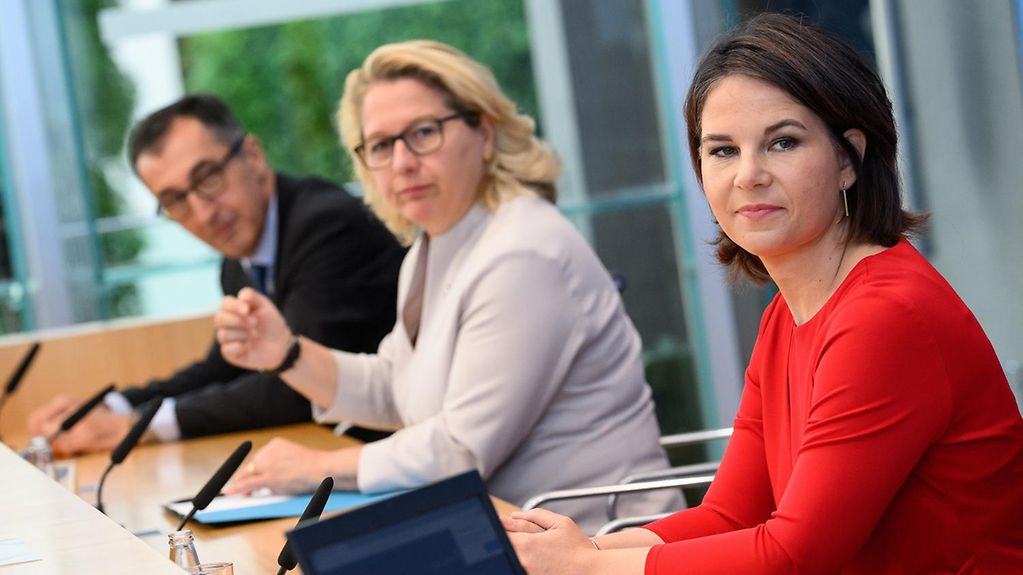Global food security
Estimates put the number of people suffering from hunger this year at over 320 million – “a barely conceivable number,” said the Federal Chancellor. “Russia bears the responsibility for the worsening of this situation,” Scholz added. The Federal Government is hosting an international conference to discuss solutions.
4 min reading time

Foreign Minister Baerbock (r.), Development Minister Schulze (centre) and Food Minister Özdemir underlined the urgent need for joint international action.
Photo: picture alliance/dpa/Bernd von Jutrczenka
Federal Foreign Minister Annalena Baerbock, Federal Development Minister Svenja Schulze and Federal Food Minister Cem Özdemir invited the G7 countries, partner countries, and representatives of the UN, NGOs and countries at risk of famine to the “Uniting for Global Food Security” international conference in Berlin. The aim is to find common responses to the threat of a global food crisis caused by Russia’s war of aggression against Ukraine.
In a video message, Federal Chancellor Scholz stressed that United Nation data indicates the most serious risk of famine in decades. According to World Food Programme estimates, the lives and livelihoods of 323 million people will be at risk this year due to food shortages. Russia’s war in Ukraine alone has put 47 million people in this situation. Scholz was emphatic that “Russia and Russia alone is responsible for the worsening of this situation.”
The conference aims to show solidarity for people from Ukraine and to facilitate exports from Ukraine. It also aims to ensure that aid supplies are ramped up for those people suffering from acute hunger while also helping boost capacity building. The meeting forms part of Germany’s diplomatic efforts and its development and food policy initiative, as well as helping to prepare for the G7 Summit which begins on Sunday in Elmau in Bavaria. Over 50 delegations and 40 ministers from around the world took part in the meeting. The conference also aimed to attract new partners to join the Alliance for Global Food Security, which Germany initiated in partnership with the World Bank through its G7 Presidency.
Need to consolidate efforts
The Federal Government is involved in national, European and international efforts to avert a global food crisis. As part of the Global Crisis Response Group set up by UN Secretary-General Guterres, the Federal Government is working to develop comprehensive and supportive solutions.
“The situation is extremely tense,” said Federal Foreign Minister Baerbock in the run-up to the conference. “We are faced with a marathon and need to act simultaneously across a range of levels,” she said, adding that the conference intended to show solidarity with Ukraine and people in the Global South who are suffering because of Russia’s war. Baerbock stressed the need to “accelerate” food exports from Ukraine such as by expanding overland and internal shipping routes. She added that there was a need to ramp up emergency aid for those suffering from acute hunger.
Safeguarding cereals exports from Ukraine
Before the war, Ukraine was one of the main suppliers of cereal crops to many countries in the Global South and to major international aid agencies. Now the destruction of infrastructure, blocked ports and crop failures are causing supply shortages. Russia, itself a major exporter of cereals, has reduced its own exports. The Black Sea ports are closed and exports through these channels are severely restricted. It is vital to ensure Ukraine has free access to global markets, not least so as to maintain Ukraine’s ability to function economically. For this reason, new and robust export routes for Ukrainian cereals must be established.
Germany is already working on this with its European partners as part of the European action plan for so-called “Solidarity Lanes” to get Ukrainian cereals out of the country. For example, Germany has pledged 500,000 euros to Ukraine to help expand storage capacities at the port of Izmail on the border with Romania.
Long-term global efforts to combat the food crisis
Coordinated measures are required to get cereal crops out of Ukraine and to improve the humanitarian situation. But there is also a need to ensure that those countries that are currently experiencing extreme suffering due to climate change can help themselves. “We don’t see ourselves as donors in this,” stressed Federal Development Minister Schulze. “We see ourselves as partners.” She warned that greater sustainability was needed in order to avoid subsequent food crises. Schulze stressed the need to plant crops such as millet that are better adapted to climate change in developing countries, as well as expanding storage capacities in those countries and boosting regional trade. The Minister also emphasised the need for a “unified approach.”
Federal Agriculture Minister Özdemir underlined this point and reaffirmed the need to adopt a holistic approach that takes in environmental and climate protections along with agriculture and food. The transition to a sustainable food and agriculture policy had always been an element of our security policy, Özdemir stressed.
With a specific focus on mitigating the impact that Russia’s war of aggression has had on global food security, Germany pledged an additional 430 million euros under its G7 Presidency. This year Germany will invest some 4 billion euros in emergency humanitarian food aid and crisis-resistant food systems.
Export quota offers a glimmer of hope
Before the war, Ukraine exported around 5 million tonnes of cereals each month. In March this year, those exports were only between 300,000 and 350,000 tonnes. The efforts of the European Union and the international community made it possible to export 1.7 million tonnes of cereals by rail and along the Danube in May. These international endeavours have already led to a significant increase in export quotas, which collapsed following the outbreak of war.